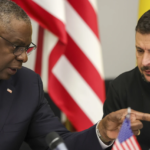If this occurred, America believed Putin would intensify his war. Is he going to?
Ukrainian military have fired a weapon provided by the United States against a target inside Russia for the first time since President Joe Biden granted them authorization to do so. In response, will Vladimir Putin, the president of Russia, escalate or broaden the conflict? Most likely not. If authorities are worried that he would, they aren’t expressing it.
However, up until today, Biden has prohibited Ukraine from doing so due to worries that doing so may cross a “red line,” encouraging Putin to unleash a tactical nuclear bomb or launch missiles on a NATO nation.
Why did Biden give up worrying? Were his actions prudent? Should he have let them go a long time ago if he was? Is Putin bluffing, as he has always done, or does he actually have any “red lines”? Have Western leaders, including Biden, been overly cautious? Should they immediately remove all obstacles and let the Ukrainians to use whatever they have to shoot at will?
First things first: Biden’s directive does not provide Ukrainians free reign. It prohibits them from firing weapons supplied by the West at any and all targets located within Russia. Rather, it restricts their ability to do so to locations where Russia has fired missiles into northeastern Ukraine, mostly in and around Kharkiv, the second-largest city in the nation.
Ukraine has been shooting its own weapons, mostly drones, at targets within Russia for a while now. Biden has refuted any connection to such strikes and has expressed neither support nor disapproval for them. Few, meanwhile, would contest Ukraine’s right to retaliate against missiles fired from within Russia that target its borders. What then is the difference? Why has using Ukraine’s own weaponry to attack Russia been acceptable (or at least not illegal) but using weapons provided by the United States or other NATO members not?
Following Biden’s announcement that he would provide Ukraine with conditions attached, Western officials, advisors, and pundits discussed in public and privately precisely how big those conditions ought to be. Where exactly were the alleged “red lines” drawn by Putin? Although it is obvious that sending in American forces—either ground troops or pilots—would be a declaration of war, are there any other kind of involvement that may enrage Putin as well? For a while, Biden and other Western officials balked at supplying Ukraine with the newest fighter jets, tanks, or long-range missiles out of fear that Putin would see even these actions as NATO intervention in the conflict and retaliate appropriately.
Regardless of the outcome of history, Biden and the other Western leaders had good cause to set such boundaries at the time. Putin was threatening to use tactical nuclear weapons in retaliation for these actions of escalation. His soldiers practiced using them in drills. Perhaps he was playing bluffs, but no one could be certain. It would be absurd and self-destructive to launch nuclear weapons, but who could say if that would be sufficient to stop Putin? (Many, like me, were skeptical that he would attack all of Ukraine since it also looked absurd and terrible.) The issue with nuclear deterrence is that it is a two-way street. (Not only is Russia discouraged from attacking us, but we are also discouraged from doing actions that may be seen as an assault on Russia’s strategic interests.)
Either way, the strategic landscape has now shifted. Biden and other officials were concerned that Putin may expand or intensify the conflict if it appeared like Ukraine was going to prevail, which is why they first placed restrictions on the types of weaponry that should be sent to Ukraine and how it should use them. (There were moments during the first year of the conflict when people believed this may be achievable when Ukraine drove the Russian invaders back.)
Now, though, there’s fear that Ukraine would lose in the absence of these more sophisticated weaponry and laxer regulations around their use. Put differently, there are now conflicting risks: the possibility that allowing Ukraine to fire weapons provided by NATO into Russia may provoke a more aggressive response from Russia, or the possibility that preventing them from doing so could allow Russia to prevail and bring about all the attendant geopolitical disasters.
As has been well known, Ukraine was running low on air defense missiles, artillery rounds, and even basic ammunition until the House of Representatives ultimately enacted the funding package for extra military help in April. (I just learned from a military advisor to NATO that, for a few weeks, the Ukrainian army only had shells kept on the front lines; it had no reserves.) Even today, when the shells and bullets are coming in again, Ukraine has relatively few weapons that can reach firing locations inside Russia and neutralize them.
As of right now, there is no longer a compelling reason to maintain the restricted policy due to the first danger. If Putin believed he was going to lose, one might envision him shooting off a few tactical nukes to shock and awe the West into stopping the conflict before it spiraled out of hand, or launching missiles into Poland (as a transit route for NATO weaponry into Ukraine). However, it’s difficult to see him going to such severe lengths if the battle was returning to a grinding standstill and the Russian forces were just losing the small, steady momentum they had been building over the previous several months.
The American presidential election of 2024 is the last item to think about. Putin will profit handsomely if Donald Trump retakes the presidency. Viktor Orbán, the prime minister of Hungary, was informed by Trump that cutting off all help to Ukraine would allow Putin to win the conflict swiftly, according to Orbán’s later statements. However, even Trump may find it difficult to allow that man in the Kremlin to get his way if Putin has attacked a NATO nation in the interim, triggering a response from all other NATO members in accordance with Article 5 of the treaty, which states that an attack on one is an attack on all, or if he has fired off nuclear weapons, violating the “nuclear taboo” that has been in place since 1945.
A president’s aversion to escalation has occasionally been commendable and other times it has been regrettable. Part of the reason John F. Kennedy turned down the Joint Chiefs’ plan (endorsed by nearly all of his advisors) to invade Cuba and take out Soviet missiles there was his belief that the Soviet Union would retaliate by seizing West Berlin in 1962. Rather, he mediated the covert removal of American weapons from Turkey and Soviet missiles from Cuba. This was fortunate because, as we subsequently discovered, 40,000 Soviet troops were concealed on the island to thwart a potential American invasion, and some of those Soviet missiles were equipped with nuclear warheads. It’s possible that JFK’s hesitation stopped World War I.
In contrast, following Putin’s annexation of Crimea and his first incursion into eastern Ukraine in 2014, Barack Obama turned down calls from his advisers, including Vice President Joe Biden, to send Ukraine anti-tank missiles. Obama justified this decision in a National Security Council meeting, saying that Russia would match any military action taken by the United States and that Ukraine mattered more to Russia than it did to the United States. Given that he invaded a portion of Ukraine in 2014 and got away with it, it’s plausible that Putin believed he could invade the entire country in 2022. Would Putin have changed his risk-benefit analysis later if some of Russia’s early invaders had been “sent home in body bags,” as Veep Biden and others said was required at the time?
The past appears lucid in the rearview mirror. However, there are instances where the course of events is completely unclear. At the time, it was unclear if Obama was correct to refrain from deploying anti-tank missiles to Ukraine or if Kennedy was correct to refrain from hitting the Soviet missiles. (At the time, both presidents’ senior advisors believed they were mistaken.)
Given the passage of time, Biden’s limitations from the previous two years may be viewed as either excessive or appropriate. However, we currently find ourselves in a unique situation where easing those constraints appears to be a very wise decision: the advantages of doing so are great, and the dangers of disastrous escalation—while not zero—are quite low.















